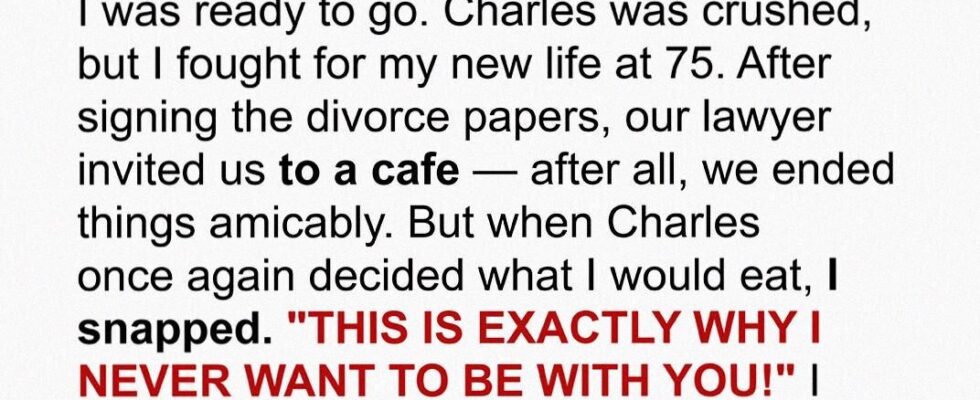After 50 years of marriage, 75-year-old Rose stood across from her husband, Charles, her voice trembling but firm. “I want a divorce,” she said. Charles blinked, stunned. “Why now?” Rose hesitated. “Because I feel like a prisoner in my own life. You control everything—where we eat, what I wear, when I take my medicine. I don’t feel like me anymore.”
Her words pierced deeper than any wound. For five decades, Charles had believed their routines were love in action—gentle guidance, not control. But Rose saw a cage where he thought he’d built comfort.
Still, Charles didn’t fight her. He simply nodded, his eyes misty. “If you need your freedom to be happy… I won’t stop you.”
They agreed to see the lawyer the following week. As a gesture of closure, their lawyer suggested they share one final dinner together, a peaceful goodbye after a lifetime.
Charles planned it carefully. He chose the Italian restaurant where they’d first danced 49 years earlier. He dimmed the lights—he remembered bright lights gave Rose headaches. He ordered her favorite dish—lasagna with no garlic—because of her digestion. He even requested they play their song in the background.
But when the waiter arrived and Charles said, “We’ll have—” Rose cut him off.
“I’ll speak for myself.”
She looked around the table. “Dimmed lights again? You always do this. You don’t even trust me to decide what I eat. Do you realize how exhausting that is?”
Charles tried to explain. “I just didn’t want you to strain your eyes… I thought I was helping.”
Rose stood up, shaking. “That’s the problem, Charles. You think everything you do is helping. But it’s always you deciding for me.”
She stormed out, tears in her eyes—leaving Charles sitting alone in the flickering candlelight, confused, broken, and heart-wrecked.
That night, back at home, Charles sat in his chair surrounded by old photo albums. He picked up a pen and wrote a letter. It read:
“My dearest Rose,
I never meant to control you. I thought love was showing up in the small things—protecting your eyes, remembering your pills, ordering your favorite meal.
Maybe I never asked enough. Maybe I assumed too much. But it was never about power.
It was always about love. Always.
If you ever want to come home, I’ll leave the porch light on.
Yours, Charles.”
But he had no way to give it to her.
The next morning, his calls went unanswered. He noticed her medication still on the counter. The worry consumed him—what if she forgot to take it?
He clutched his chest. Pain radiated down his arm. Minutes later, Charles collapsed from a heart attack.
Paramedics arrived just in time. At the hospital, he whispered one thing before fading into unconsciousness: “Tell Rose… I’m sorry.”
Rose, meanwhile, was across town in a rental apartment. Free. Independent. Lonely. She had bought herself flowers for the first time in years. But they didn’t feel like a celebration. They felt like a funeral.
Then the call came.
She rushed to the hospital, only to be told Charles was in critical condition.
Beside his bed, she found the letter in his coat pocket. As she read it, her hands trembled.
Tears streamed down her face as realization dawned: his “controlling” ways had been his broken version of love. Flawed, but never cruel. She leaned in and whispered, “Come back, Charles. Come back… I didn’t know. But I do now. I still love you.”
